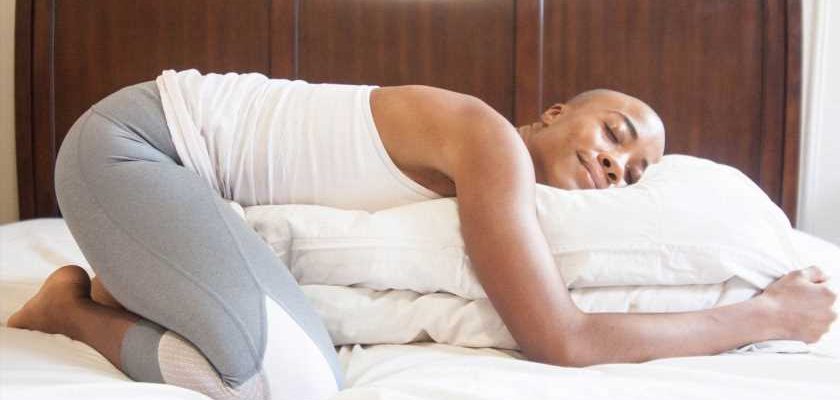’Pillow yoga’ is the flow designed to soothe period cramps (without leaving your bed)
Looking for a gentle yoga flow to help soothe those pesky period cramps? Look no further…
Sometimes, when we’re tired or suffering with intense period pain, the last thing we want to do is an energetic, core sculpting, sweaty workout. Instead, we want to cocoon ourselves in our duvet, listen to our bodies and nourish ourselves with a simple, quiet yoga practice.
Enter: pillow yoga. A grounding, calming and healing stretch sequence, it’s the perfect yoga flow for period cramps. Poses are done from a seated or lying down position, and gently work to open up tight hips and support the pelvis – the perfect tonic after a long day of sitting down, when you’re feeling bloated or to ease work-related stress.
What is pillow yoga?
“I came up with the concept of pillow yoga when I started to skip out on yoga whenever I was in my period,” says Maja Sobieska, yoga teacher and founder of Yoga with Maja.
“My period cramps were so painful, so I started experimenting with simple, restorative poses, and I found that using a pillow or bolster can relieve common symptoms like period cramps, lower back pain and migraines.”
You may also like
Stretching: 4 of the best yoga stretches to start your morning
Can you do pillow yoga from bed?
Absolutely, in fact, it’s encouraged. “Pillow yoga is perfect for doing from your bed, when you first wake up or before you fall asleep – it’s all about comfort, honouring your body and releasing energy and emotions,” she says.
What are the benefits of pillow yoga?
This restorative practice is perfect for people who want to just slow down, nurture and just be, says Sobieska.
There are no planks, no warriors, no core work. No dynamic sun salutations. No standing poses. No inversions. The pace is slow, you can wear pajamas and keep your socks on. It’s all about releasing tension.
“The poses used in pillow yoga benefit your organs, acting as an internal massage and, in this case, a release for your uterus muscles. When we take a closer look at child’s pose for example, we can see that the pose has the ability to flex your reproductive organs, as well as releasing tension in your back, shoulders and neck.”
You may also like
Yin yoga helped ease my pandemic anxiety – and it might help yours too
Should you practice yoga during your period?
Some people think that they can’t practice yoga when they’re on their period. But the truth is, if you are on your menstrual cycle, yoga can often help.
In fact, a 2011 study from the International Journal of Yoga showed that women with abnormal periods (lots of pain, infrequent or light periods, an abnormally heavy flow, or between-period bleeding) who practised Yoga Nidra for five days a week reported greater relief from painful cramps, heavy bleeding, and menstrual irregularity than those who did not.
“When we are bleeding, we have what’s known as the ‘Apana energy’ residing in the pelvis and lower abdomen, which basically means that the body is working to push the blood flow down and out,” explains Sobieska. “When we practice standing poses or inversions, we are working against this energy – for example, during inversions the uterus is often pulled towards the head, which can cause an increased menstrual flow and heavy bleeding. But when we are seated, we are grounding our body.”
The most important thing to remember is to go with your own flow, she adds. “Some periods are easier than others and they vary from month to month, remember that you are your own authority and only you know what your body needs and craves.”
3 pillow yoga poses
Child’s pose
- Kneel on your hands and knees, with your hands in front of your shoulders and your knees about hip-width apart, or wider if that is more comfortable and your big toes touching.
- Place a pillow in between your legs and as you exhale, lower your glutes toward your heels and rest your torso and your head on the pillow.
- Rest your arms around the pillow.
- Release the muscles around the spine and hips and take several slow breaths.
Reclining butterfly pose
- Lie flat on your back and bring the soles of your feet together with legs bent, and your knees facing outwards.
- Place a pillow under both your thighs and an additional pillow (if you want) behind the head.
- Gently place your hands on your stomach. Close your eyes, relax your jaw, and focus on your breathing – concentrating on slow and deep breaths.
Reclining twist
- Lying flat on your back, bend both your legs at a 90-degree angle and let them fall gently to the left.
- Stack your knees on top of one another at hip level, and then slide a pillow between your thighs.
- Extend your arms straight out at shoulder level and turn your head to the right (you can always pop another pillow under your head here too).
- Close down the eyes and relax your belly and breath. Stay in this position for as long as you like, enjoying the spinal twist, before then swapping sides – twisting your legs to the right, and your head to the left.
You may also like
Feeling stressed and anxious before bed? These yoga poses will help you to get to sleep
Follow @StrongWomenUK on Instagram for the latest workouts, delicious recipes and motivation from your favourite fitness experts.
IMAGE Credit: Alex Bershaw / Sara Clark
Source: Read Full Article
